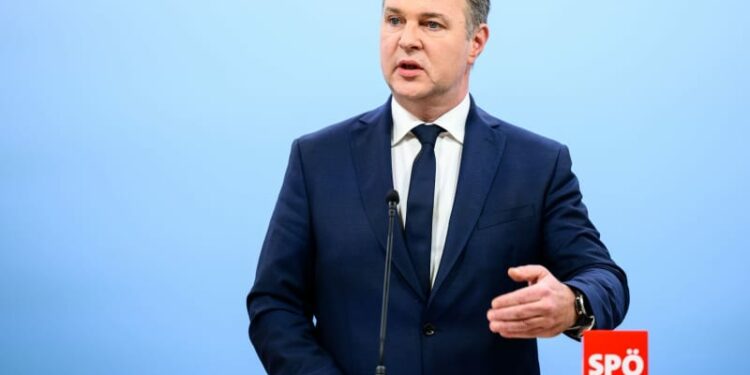Following the failure of talks on a three-way coalition in Austria, the conservative Austrian People’s Party (ÖVP) and the Social Democrats (SPÖ) want to continue one-on-one coalition talks.
Austrian President Alexander Van der Bellen said Friday that both parties have announced their intent to talk about a grand coalition.
The liberal NEOS party had previously announced its withdrawal from the weeks-long coalition talks with the ÖVP and the SPÖ.
NEOS leader Beate Meinl-Reisinger said that it was clear that the necessary will to reform was not emerging.
“We always had one goal: to do more than just the bare minimum,” she asserted.
Parties want to govern without the FPÖ
The ÖVP, SPÖ and NEOS have been negotiating a coalition since mid-November. Such a coalition of three parties would have been a first in Austria.
The talks were also an attempt to keep the clear election winner, the right-wing Freedom Party of Austria (FPÖ), out of power.
The Social Democrats said on Friday evening that they are ready for talks on a potential coalition with the ÖVP.
“Our hand remains outstretched,” SPÖ leader Andreas Babler said on Friday.
It is now up to Chancellor and ÖVP leader Karl Nehammer to continue bilateral negotiations with the Social Democrats, Babler told a press conference.
He demanded that the necessary budget consolidation should not be shouldered by workers, pensioners and civil servants, but by richer sections of the population.
Federal president puts pressure on
Van der Bellen called on the ÖVP and SPÖ to negotiate with each other “without delay.”
“I want clarity – quick and comprehensive clarity,” he said.
However, even if the conservatives and social democrats forge a grand coalition, they would only have a wafer-thin majority of one vote in parliament.
The failure of the three-way talks is considered a major blow for Nehammer. He had strictly ruled out working with the right-wing FPÖ under its leader Herbert Kickl and had set the three-way alliance as an alternative.
FPÖ feels vindicated
The FPÖ feels vindicated in its predictions.
For months, it had been warning against what it called a “political aberration” of a red-green-yellow coalition government modelled on Chancellor Olaf Scholz’s former three-way coalition in Germany, FPÖ General Secretary Michael Schnedlitz said.
“Karl Nehammer has ignored all these concerns because, in truth, he is only concerned about one thing: his own job as chancellor!” he asserted.
The FPÖ called for the chancellor’s resignation.
New elections as a further option
If no ÖVP-SPÖ coalition is formed, new elections are considered possible. In this case, the right-wing populists could hope for a resounding victory.
The latest opinion polls signal a further significant increase in votes compared to the national council elections. According to these, the FPÖ could again significantly increase its result from 29 per cent to around 35 per cent.
The sticking point in the three-way negotiations was the planning of a new budget.
Austria is in the throes of an economic crisis and at the same time has to make severe cuts in order to meet the EU criteria for financial stability.
Striking a balance between austerity measures and measures to boost the economy is considered the main task of a new government.
From the ÖVP’s point of view, the SPÖ is mainly responsible for the collapse of the three-way talks.
“While parts of the Social Democratic Party have constructively participated, in recent days the backward-looking forces in the SPÖ have gained the upper hand,” wrote ÖVP Secretary General Christian Stocker.
FPÖ victory at the polls – but no coalition partner
At the end of September, the FPÖ won Austria’s parliamentary elections. However, no other party considered the FPÖ or its leader, Kickl, to be capable of governing.
From the point of view of his political opponents, Kickl has become more radical in recent years. Since no one wanted to work with the party, a so-called “candy coalition” was negotiated. This name comes from the party colours turquoise (ÖVP), red (SPÖ) and pink (NEOS).
Any new Austrian government faces immense tasks which require a smoothly functioning coalition.
It faces structural problems including the pension system, which has long since ceased to be covered by contributions. The state has to spend a large part of the budget on supporting pension payments.
Due to expensive wage agreements, unit labour costs are no longer competitive from the point of view of the Industrial Association. Unemployment is around 7%.
Source link : http://www.bing.com/news/apiclick.aspx?ref=FexRss&aid=&tid=67790591711b4bee9128d9d6ee90aa1c&url=https%3A%2F%2Fwww.yahoo.com%2Fnews%2Faustrias-vp-sp-continue-coalition-211719079.html&c=17918016134259103576&mkt=de-de
Author :
Publish date : 2025-01-03 13:17:00
Copyright for syndicated content belongs to the linked Source.


